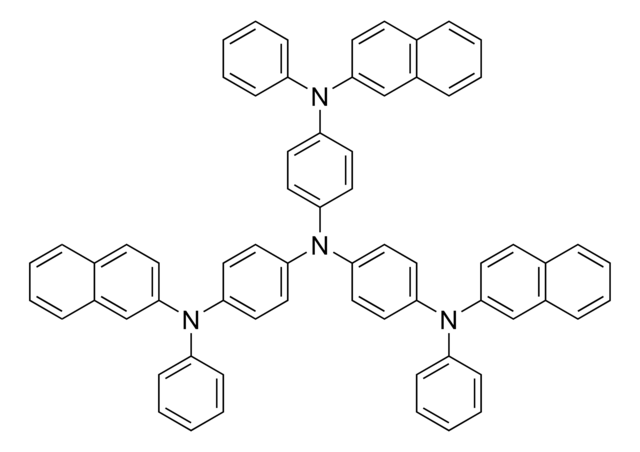925764
Tris(4-carbazoyl-9-ylphenyl)amine
≥97%
Synonyme(s) :
TCTA
About This Item
Produits recommandés
Niveau de qualité
Pureté
≥97%
Forme
(Solid/Powder)
Couleur
light yellow, transparent
Pf
179-183 °C
λmax
385 nm (in THF)
Énergie orbitale
HOMO 5.83 eV
LUMO 2.43 eV
Absorption UV
λ: 293 nm Amax: in THF
λ: 326 nm Amax: in THF
Température de stockage
2-8°C
Chaîne SMILES
c1ccc2c(c1)n(-c3ccc(cc3)N(c4ccc(cc4)-n5c6ccccc6c7ccccc57)c8ccc(cc8)-n9c%10ccccc%10c%11ccccc9%11)c%12ccccc2%12
InChI
1S/C54H36N4/c1-7-19-49-43(13-1)44-14-2-8-20-50(44)56(49)40-31-25-37(26-32-40)55(38-27-33-41(34-28-38)57-51-21-9-3-15-45(51)46-16-4-10-22-52(46)57)39-29-35-42(36-30-39)58-53-23-11-5-17-47(53)48-18-6-12-24-54(48)58/h1-36H
Clé InChI
AWXGSYPUMWKTBR-UHFFFAOYSA-N
Vous recherchez des produits similaires ? Visite Guide de comparaison des produits
Application
TCTA is widely used as a hole-transport and hole-injection material in light-emitting diodes and perovskite solar cells.
TCTA is a very popular phosphorescent host material due to its large band gap (Eg = 3.4 eV) for green, red and white phosphorescent organic light-emitting diodes (PhOLEDs).
Examples of OLED device performance:
1. ITO/NPD/TCTA/BCPO:Ir(piq)3 (7-8%)/BCP/Alq3/LiF/Al
Color: red
Max. Luminance: 24529 Cd/m2
Max. EQE: 17 %
Turn-On Voltage: 2.7 V
2. ITO/NPD/TCTA/BCPO:Ir(ppy)3 (7-8%)/BCP/Alq3/LiF/Al
Color: green
Max. Luminance: 207839 Cd/m2
Max. EQE: 21.6 %
Turn-On Voltage: 2.1 V
3. ITO/PEDOT:PSS/NPD/TCTA/m-CBTZ:FIrpic (10 wt%)/DPPS/TAZ/LiF/Al
Color: blue
Max. Luminance: 29500 Cd/m2
Max. EQE: 8.8 %
Turn-On Voltage: 3.5 V
4. ITO/PEDOT:PSS/NPD/TCTA/m-CBTZ:Ir(Bt)2(acac) (10%)/TPBI/LiF/Al
Color: yellow
Max. Luminance: 106000 Cd/m2
Max. EQE: 17.5 %
Turn-On Voltage: 3 V
Produit(s) apparenté(s)
Mention d'avertissement
Warning
Mentions de danger
Conseils de prudence
Classification des risques
Eye Irrit. 2 - Skin Irrit. 2 - STOT SE 3
Organes cibles
Respiratory system
Code de la classe de stockage
11 - Combustible Solids
Classe de danger pour l'eau (WGK)
WGK 3
Point d'éclair (°F)
Not applicable
Point d'éclair (°C)
Not applicable
Faites votre choix parmi les versions les plus récentes :
Certificats d'analyse (COA)
Vous ne trouvez pas la bonne version ?
Si vous avez besoin d'une version particulière, vous pouvez rechercher un certificat spécifique par le numéro de lot.
Déjà en possession de ce produit ?
Retrouvez la documentation relative aux produits que vous avez récemment achetés dans la Bibliothèque de documents.
Notre équipe de scientifiques dispose d'une expérience dans tous les secteurs de la recherche, notamment en sciences de la vie, science des matériaux, synthèse chimique, chromatographie, analyse et dans de nombreux autres domaines..
Contacter notre Service technique
![N-([1,1′-Biphenyl]-4-yl)-9,9-dimethyl-N-(4-(9-phenyl-9H-carbazol-3-yl)phenyl)-9H-fluoren-2-amine ≥97%](/deepweb/assets/sigmaaldrich/product/structures/334/842/a358db6a-5ec8-4c88-902f-856ed7d79fb6/640/a358db6a-5ec8-4c88-902f-856ed7d79fb6.png)
![Di-[4-(N,N-di-p-tolyl-amino)-phenyl]cyclohexane ≥97% (HPLC)](/deepweb/assets/sigmaaldrich/product/structures/111/787/16bde1ce-c76d-46d6-9e1f-9ce09f82d038/640/16bde1ce-c76d-46d6-9e1f-9ce09f82d038.png)


![4,4′,4′′-Tris[phenyl(m-tolyl)amino]triphenylamine 98.0%](/deepweb/assets/sigmaaldrich/product/structures/370/101/1022653f-ed3b-4991-a82c-269ad710b908/640/1022653f-ed3b-4991-a82c-269ad710b908.png)



